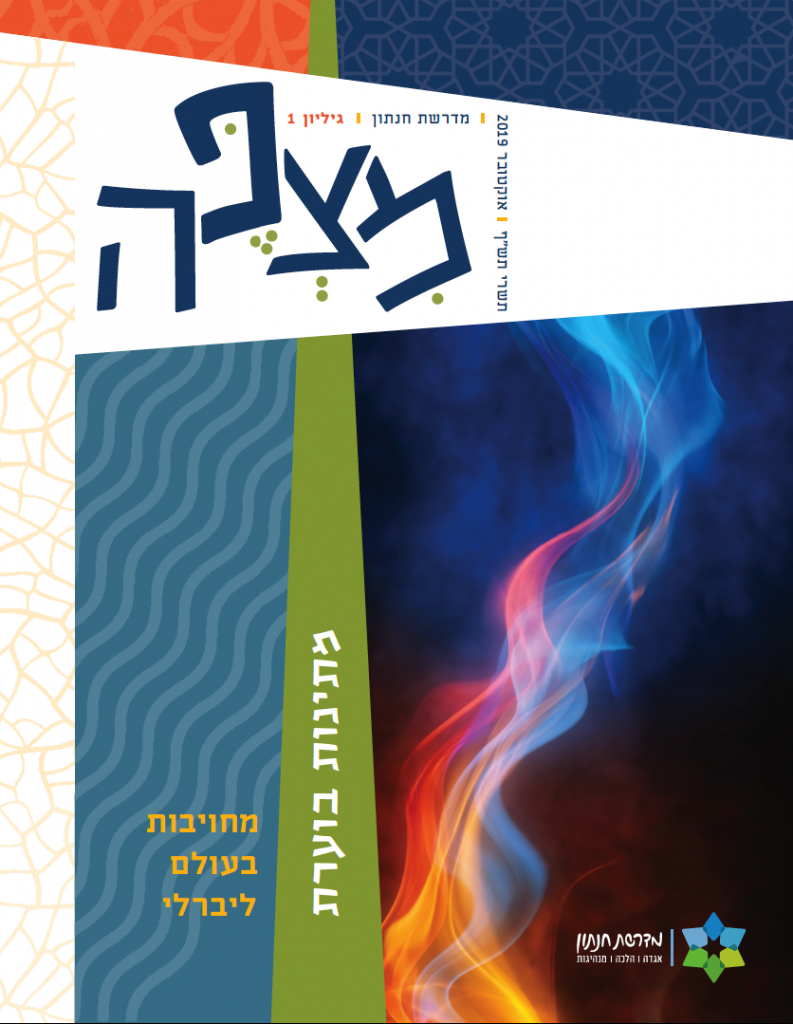It seems to me lately that every time I turn around, I find another community, institution, or organization dealing with Judaism in Israel that has included the term “Israeli” in its name: congregations, synagogues, non-profits, organizations, and even books of commentary on Jewish classics are becoming “The Israeli Congregation of . . . ” “Israeli Jewish Center for . . . ” “an Israeli Jewish home for . . . ” “the Israeli . . . Organization,” “a new Israeli commentary to . . . ,” and the like. Of course, every organization is entitled to call itself whatever it deems appropriate. If it helps a community to define itself as “an Israeli Jewish community,” who am I to object? Everyone has the right to be comfortable with his or her own identity. Nonetheless, I ask myself: what are those institutions trying to express when they use the adjective “Israeli” in their names?
It seems to me that some of those congregations and organizations, especially those operating in the realm of Jewish renewal, and especially those that are not necessarily Orthodox, insert the word “Israeli” to express their attempt to distance themselves from diaspora Judaism—the Judaism of galut, to use Zionism’s classic derogatory term for life in “exile.” These institutions seem to be saying, “Maybe we started out as Reform or Conservative, which we all know are movements imported from abroad, but it is important for us to say that we are the real thing. We are authentic Israeli Jews. We are renewing Judaism as Israelis here in Israel.” If Herzl dreamed that in Israel a “new Jew” would arise in Israel, today in Israel people are looking for a new Judaism.
The use of the term “Israeli” in a name also expresses a yearning for Jewish unity. The argument is this: We are a splintered people. We need to distance ourselves not only from the diaspora but also from the narrow, divisive definitions we had there. It would be a mistake to define ourselves as this kind of Jew or that kind of Jew, belonging to this or that historical Jewish ethnic community, since we are all Israeli Jews! Why do we need any other kind of label?
In addition to the desire to indicate a new Israeli identity comprising various ethnic identities, and in addition to the desire to create distance from diaspora roots, adding the word “Israeli” to an organization’s name makes it possible to downplay the religious nature of the organization. The term “Judaism” carries negative connotations among parts of Israeli secular society, whereas the term “Israeli” sounds younger, more vibrant, more modern, more inviting. Organizations try to attract Israeli Jews who may be antipathetic to Jewish religious life by calling themselves “Israeli”—as a way of marking themselves as identifying with the cultural aspects of Judaism, and not necessarily the religious aspects.
All these claims are true. Using the term “Israeli” in a name may, in fact, do what the people who use the word think it will do. It also adds to the myth of “Israeliness” within the world of Jewish renewal.
The truth is, it would be awfully strange if a new type of Judaism were not to develop here in Israel. A Judaism which develops within a modern society, in a country in which Jews are the dominant majority, is a completely new phenomenon, made possible only within the last century, with the creation of the modern State of Israel. Obviously a new type of Jewish expression has arisen in Israel, a type of Judaism that is different in many ways from all other types of Judaism that developed through any other time in history. One of the clues to the change is the ingathering of the diaspora communities, which has led to a situation in which Israeli society today includes a mix of Jews from different ethnicities and cultures in a manner unprecedented in our people’s history. As a result, in many homes in Israel at this time, family tradition is influenced by the customs of different historical communities: if my mother is Yemenite and my father comes from Poland, it is natural that I absorb customs of both those communities. In the tradition I pass on to my own children there will be characteristics of the two traditions I received from my parents, and in my grandchildren’s home, it may no longer be clear what is a Yemenite custom and what is a custom from Poland, because they will have been fused into Israeli customs. This process is at work not only within families. We are influenced by our neighbors and by those around us—at work, in school, and in every place where we meet each other. The fusion of practices from an enormous range of worldwide Jewish communities is unique to Israel and engenders the development of Jewish customs that we call “Israeli,” because they do not belong to one or another historic Jewish community alone.
“Judaism” has negative connotations for some of secular Israeli society, so the term “Israeli” is used.
In Israel, Jewish culture grapples with new challenges and situations, and it develops in contemporary ways. That is a fact, and I am certain that the organizations that insert the term “Israeli” into their names do wonderful work, in precisely the directions that I think are important and that correspond to my values. Nevertheless, I feel a certain amount of discomfort with the adoption of the term “Israeli” by each additional Jewish organization. What is at the root of that discomfort? When we define one thing as “Israeli,” that means something else is not “Israeli,” and therein lies the problem. What makes something “Israeli Judaism?” If we spread out some mats and pray outdoors, can we call our prayer service “Israeli?” And if we sit on chairs in a room, can it not be “Israeli Judaism?” If prayer using one version of the liturgy is “Israeli,” then if we pray using a different version, is that not “Israeli?” If a blend of Jewish ethnic traditions is “Israeli,” then is an attempt to preserve one’s original Jewish ethnic identity not “Israeli?” From my perspective, the use of the term “Israeli” in a name brings about the exact opposite of what it seems to me is the goal of using it: It says, “What I do is Israeli, and therefore legitimate, and what you do is not Israeli, and therefore it is not as good, not as authentic.” I would guess that that was not the message intended by the use of the term “Israeli” in most cases, but for me, that is the result.
These thoughts were already rolling around in my head as I began to read the book Israeli Judaism: Portrait of a Cultural Revolution, by Shmuel Rosner and Camil Fuchs.[1] At first glance, the name of the book would support the idea that there is something that can be called “Israeli Judaism.” The authors describe and analyze types of Jewish expression that developed here in Israel and that can be sustained only here, such as the custom of riding bicycles on public roads on Yom Kippur. That is a practice that it is impossible to imagine developing anywhere else in the world. It is Jewish because it occurs “in an important date in the Hebrew calendar, Yom Kippur. Only on the holiest day of the Jewish year do the streets clear up,” and that is Israeli because “only in Israel do the streets clear up for bicycles on Yom Kippur.”[2] Therefore, even though certainly not all Israeli Jews ride bicycles on Yom Kippur, there is no doubt that a new custom—connected to the Jewish calendar and developed here in Israel—can be described as a custom of Israeli Judaism.
Despite the citation of customs and practices that they claim are specifically Israeli Jewish practices, it seems that Rosner and Fuchs actually support my feeling that Israeli Judaism is not one thing. There is no one entity, no one set of practices, that can be labeled Israeli Judaism. Rather, Israeli Judaism contains a rich and exciting range of beliefs, celebrations, creative expressions, and customs in which the old is integrated with the new, and from which contemporary Israeli Jewish culture is woven. Solidarity and a sense of belonging are positive qualities. We do not want to feel that we live in a splintered and fractured society. But as Rosner and Fuchs convey, to argue is not necessarily terrible, since variety is an integral characteristic of Israeli Judaism.[3] Moreover, variety is precisely what makes Judaism here Israeli, and so renders the word “Israeli” in the name of a Jewish organization in Israel almost meaningless.
The use of the term “Israeli,” then, in the context of Jewish renewal sends a message that Israeli Jewish renewal is legitimate only in one particular model. That is a myth that needs to be shattered. There is no one model of Israeli Judaism, just as there is no one model of Judaism, even though there are those who would make such a claim. The Israeli Judaism that I seek is a Judaism open to the possibility that within it there can be different paths from the one in which I practice my Judaism. And thus I hope that every institution, every community, and every organization working on behalf of Jewish renewal in Israel continues to enthusiastically and energetically strive to create a vibrant, relevant, modern and dynamic Judaism—whether those organizations choose to use the word “Israeli” in their names, or not.
[1] Shmuel Rosner and Camil Fuchs, Yahadut Yisra’elit: Dyokan shel Mahapekha Tarbutit (Tel Aviv: Dvir, 2018). English edition: Israeli Judaism: Portrait of a Cultural Revolution (Jerusalem: Jewish People Policy Institute, 2019).
[2] Rosner and Fuchs (2019), 62.
[3] Rosner and Fuchs (2019), 194.





